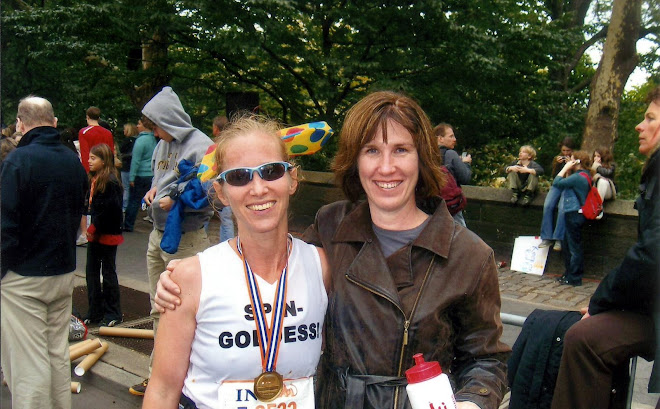This is from Jim2's Running Page, http://mysite.verizon.net/jim2wr/id37.html
"I thought I would offer a few things that I do to help maintain or increase pace in those late stages of a race when your legs and cardio-respiratory system are crying for relief.
There are certain things you can do in training to help prepare you for this challenge, such as increasing the pace toward the end of a long run when you are tired. And making sure that your speedwork is paced so that the last couple of intervals or hill repeats are the fastest, as well as the hardest. But, once you are in a race, it's too late to deal with training. You've got to make the most you can of the preparation that you have.
If you have run the first part of the race much too fast and are in severe oxygen debt with a lot of lactic acid built up in your legs toward the end, you probably blew it and won't be able to maintain pace. You will just have to accept a slower finish and learn from the experience. If you have run a smartly paced race, or even more conservatively than necessary in the first part, you have a good opportunity to really "go for it" at the end. Either way, the last part of the race is the hardest part and the tricks that you use late in a race to get the most that you can out of it should be chosen to take your mind off of how you feel and how much you want to ease up. In other words, try to take your mind off of those things that are demanding your attention......your screaming lower body, racing heart and gasping lungs.
One obvious thing is to focus on passing other runners. Pick them off one at a time. After you pull up behind one, give a little more of a push to pass with authority. It will give you a psychological boost. Plus, the momentary increase in pace will make your "normal" pace feel just a little easier when your "extra push" eases. Then focus on the next runner and go after him/her. If you are running close to someone else when you are within a couple hundred yards/meters of the finish line, challenge him/her to race to the finish. You don't even have to waste energy and breath to discuss it. Sometimes just a glance will do. Or just yell "Let's Go!" with a big exhale.
Run the last 10-20% of a race on your upper body. And, I don't mean running on your hands. For every stride, there is a corresponding arm swing.....and vice versa. If you can maintain or increase your arm swing rhythm and pace, your leg turnover must keep up....no matter how badly they feel. (One fast runner who usually posts on the Competitive Forum thanked me for this tip and said that it helped him to pull a 30 second PR out of the last mile of this year's Boston Marathon after I posted it a week before the race.) I think of the upper body as an auxiliary engine that you can call on late in the race. Just let it idle through most of the race, so it should be fresh to "take over" later. Still, in a long race, such as a marathon, shoulders and arms can also get tired. After all there are approximately 40,000 arm swings, as well as strides, in a marathon. Upper body weight work as part of your training regimen helps to prepare you for it.
Check your form frequently. Most of us have a tendency to lean forward at the waist and let our butt slip back when we are tired. When this happens, your running efficiency is reduced. You have to expend more energy for the same forward progress. Compounding it, when you slump forward, your lungs are compressed slightly and their capacity is reduced. (You can sample the effect of slumping on lung capacity while running easy or even while sitting in your chair reading this.) Just when your body is screaming for more oxygen, a slump reduces the amount available to distressed muscles. So, think about keeping your head up, shoulders back and pelvis forward. Running develops our back and buttocks, but not our abdominals, which are critical to maintaining pelvic balance and positioning. Bent knee sit-ups and crunches to strengthen the abdominal muscles help here.


No comments:
Post a Comment